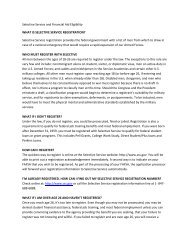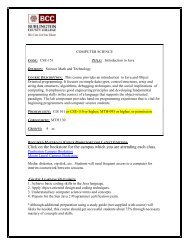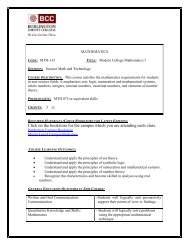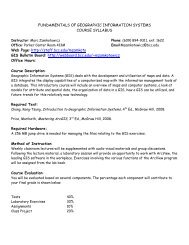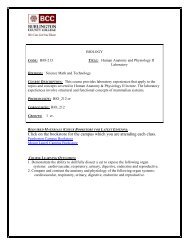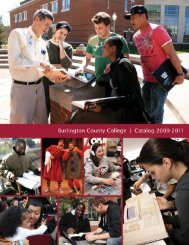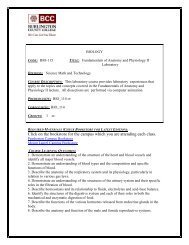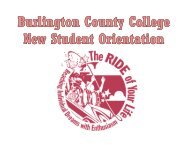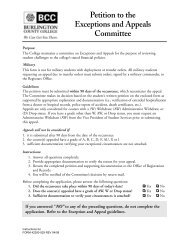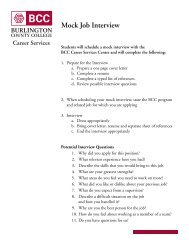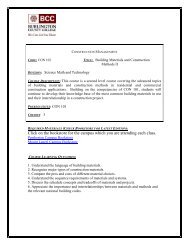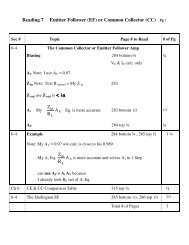Computer Science - Burlington County College
Computer Science - Burlington County College
Computer Science - Burlington County College
You also want an ePaper? Increase the reach of your titles
YUMPU automatically turns print PDFs into web optimized ePapers that Google loves.
EET 141 Digital Circuits 4 cr.<br />
This course introduces the theory and design<br />
of logic circuits used in computers and other<br />
digital instruments. It covers digital systems,<br />
binary numbers, binary logic gates, combinatorial<br />
logic and simplification techniques; data<br />
selector logic; encoders and decoders; flipflops,<br />
counters, shift registers, memories and<br />
analog conversion devices. It uses computerbased<br />
modeling and simulation tools and<br />
includes a final project and oral presentation.<br />
Prerequisite: EET 121<br />
3/3/0 Course fee charged<br />
EET 210 IT Essentials: A+ 4 cr.<br />
This course is an in-depth exposure to<br />
information technology and data communications.<br />
Students develop the necessary skills to<br />
enter this field by building a computer, installing<br />
the operating system, adding peripherals, and<br />
connecting the computer to a local area network<br />
and to the Internet. This course helps students<br />
prepare for CompTIA’s A+ certification exam.<br />
Prerequisite: EET 101<br />
3/3/0 Course fee charged<br />
EET 222 Circuits II 3 cr.<br />
This course covers the fundamentals of AC<br />
electrical circuits. It focuses on series/parallel<br />
RLC circuits, voltage and impedance phasor<br />
diagrams, power in AC circuits, filters,<br />
resonance, frequency Response, and BODE<br />
plots. There is a final project with a written<br />
report and an oral presentation.<br />
Prerequisite: EET 121, MTH 130<br />
2/3/0 Course fee charged<br />
EET 225 Wiring – Residential and Commercial<br />
Construction 3 cr.<br />
This course covers the knowledge and practice<br />
of methods used in the installation of<br />
residential and commercial electrical systems,<br />
with particular emphasis on the specific<br />
requirements and examples involved with<br />
sustainable energy technologies – solar PV and<br />
thermal, geothermal heat pump, and small<br />
wind. Safe working practices are emphasized<br />
at all times, with reference to and emphasis on<br />
the National Electrical Code.<br />
Prerequisite: EET 121<br />
3/0/0 Course fee charged.<br />
EET 232 Analog Integrated Circuits 4 cr.<br />
This course focuses on the characteristics and<br />
applications of analog integrated circuits<br />
including operational amplifiers and<br />
specialized linear integrated circuits. It investigates<br />
circuits including inverting, noninverting<br />
and differential amplifiers, non-linear,<br />
active filters, equalizers, oscillators, timers, and<br />
power supply regulator IC’s. Laboratory<br />
experiments cover the course topics and verify<br />
lecture theory.<br />
Prerequisite: EET 121<br />
3/3/0 Course fee charged<br />
EET 242 Microprocessor Systems 4 cr.<br />
This course examines microcomputer<br />
programming, analysis, and troubleshooting<br />
for real-time applications. The major emphasis<br />
is the verification of student-assembled<br />
programs that use both serial and parallel<br />
input-output devices on a microcomputer<br />
system. It includes numbering systems, microprocessor<br />
unit, memory, input/output,<br />
instruction sets, addressing modes, assembler<br />
techniques, systems configuration, hardware,<br />
subroutines, and example programs. There is<br />
a final project with a written report and oral<br />
presentation.<br />
Prerequisite: EET 141<br />
3/3/0 Course fee charged<br />
EET 251 Industrial Electronic Controls 4 cr.<br />
This course examines the principles, devices<br />
and circuits applicable to industrial electronic<br />
control systems. It includes op-amps, signal<br />
conditioning circuits, switches, relays, SCR’s,<br />
TRIAC’s sensors, various types of motors,<br />
mechanical systems (hydraulic and<br />
pneumatic), open and closed-loop control<br />
systems, microprocessor control, and programmable<br />
logic controllers.<br />
Prerequisite: EET 131, EET 222<br />
3/3/0 Course fee charged<br />
EET 291 Special Projects in Electronics<br />
Engineering Technology I 1 cr.<br />
EET 292 Special Projects in Electronics<br />
Engineering Technology II 2 cr.<br />
EET 293 Special Projects in Electronics<br />
Engineering Technology III 3 cr.<br />
These courses are special projects where<br />
students work on projects approved by the<br />
instructor. The projects require 3-6 hours per<br />
week depending on the course credit.<br />
Students are required to propose, design,<br />
construct, test, debug, and demonstrate the<br />
electronics project.<br />
Prerequisite: Permission<br />
Emergency Medical Services<br />
EMS 101 Basic Emergency Medical<br />
Technician 8 cr.<br />
This course will cover all aspects of prehospital<br />
care and special circumstances that<br />
may be encountered. Students will be<br />
required to perform a 10 hour hospital<br />
observation rotation prior to the end of this<br />
course. Skills that will be learned during the<br />
course are: spinal immobilization; respiratory<br />
care; care of the pediatric patient; and care of<br />
the trauma patient. The following programs<br />
will also be covered in the course: IMS<br />
100/700; Haz-Mat Awareness ; and CBRNE<br />
Awareness. Students successfully completing<br />
the course and the NJ Department of health<br />
exam are certified as emergency medical<br />
technicians.<br />
Prerequisite: CPR for Professional Rescuers<br />
8/0/0 Course fee charged<br />
Energy Management<br />
NRG 101 Introduction to Energy Management<br />
3 cr.<br />
This course defines the need for energy<br />
management as an integral part of society at<br />
all levels. Students will understand basic<br />
energy accounting and analysis protocol. The<br />
course will also present the various vocational<br />
opportunities available to energy management<br />
students through lectures, video and guest<br />
speakers.<br />
3/0/0<br />
NRG 112 Commercial Energy Use Analysis<br />
4 cr.<br />
Emphasis is on the analysis of energy use in<br />
commercial buildings. Topics include utility bill<br />
analysis, audit data, identifying energy<br />
efficiency measures, use of micro-dataloggers,<br />
energy savings and investment calculations,<br />
audit report writing. Students will complete a<br />
supervised field audit.<br />
Prerequisite: SST 110 and NRG 121 and Math<br />
095 or Math Placement Test<br />
3/3/0<br />
NRG 113 Building Energy Simulations 4 cr.<br />
The course covers the variety of computer<br />
programs available for analyzing commercial<br />
buildings. Topics include BIN methodology,<br />
hourly simulations and an overview of current<br />
programs on the market such as eQuest.<br />
Students perform supervised computer<br />
simulations.<br />
Prerequisite: NRG 112<br />
3/3/0<br />
NRG 121 Air Conditioning Systems Analysis<br />
3 cr.<br />
Students will investigate the physical principles<br />
of heating, ventilation, and air conditioning<br />
systems commonly found in the commercial<br />
setting. Topics will include: the energy<br />
equation, change of state, and refrigeration.<br />
The course will also cover sensible and latent<br />
heat equation, psychrometrics, heat and<br />
cooling load equations, solar effects, effects of<br />
thermal mass, central forced air furnaces,<br />
SEERs, EERs, AFUEs, fuels, and unitary single<br />
zone and multi-zone secondary systems.<br />
Prerequisite: PHY 110, PHY 111<br />
Co-requisite: PHY 110, PHY 111<br />
2/3/0<br />
NRG 123 Energy Control Strategies 4 cr.<br />
Topics include building system control theory<br />
and devices, including electric, pneumatic,<br />
and digital controls. An emphasis is placed on<br />
identifying and understanding control<br />
strategies related to energy-using systems and<br />
methods to estimate energy savings. Handson<br />
labs reinforce device identification and<br />
students complete an energy efficiency<br />
controls calculation project.<br />
Prerequisite: NRG 124<br />
3/3/0 Course fee charged<br />
To access outlines for these course descriptions, please visit http://www.bcc.edu/pages/476.asp<br />
www.bcc.edu<br />
155



